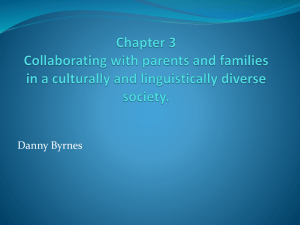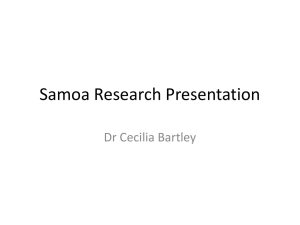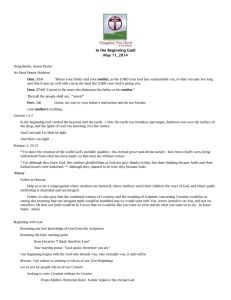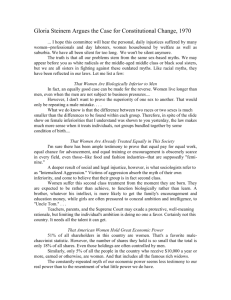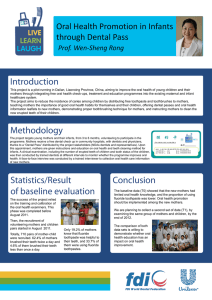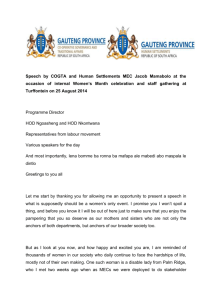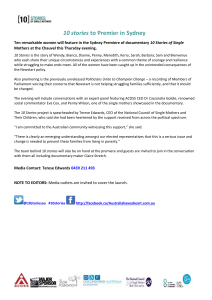`Happy baby smiles of the South Pacific` (full project definition)
advertisement
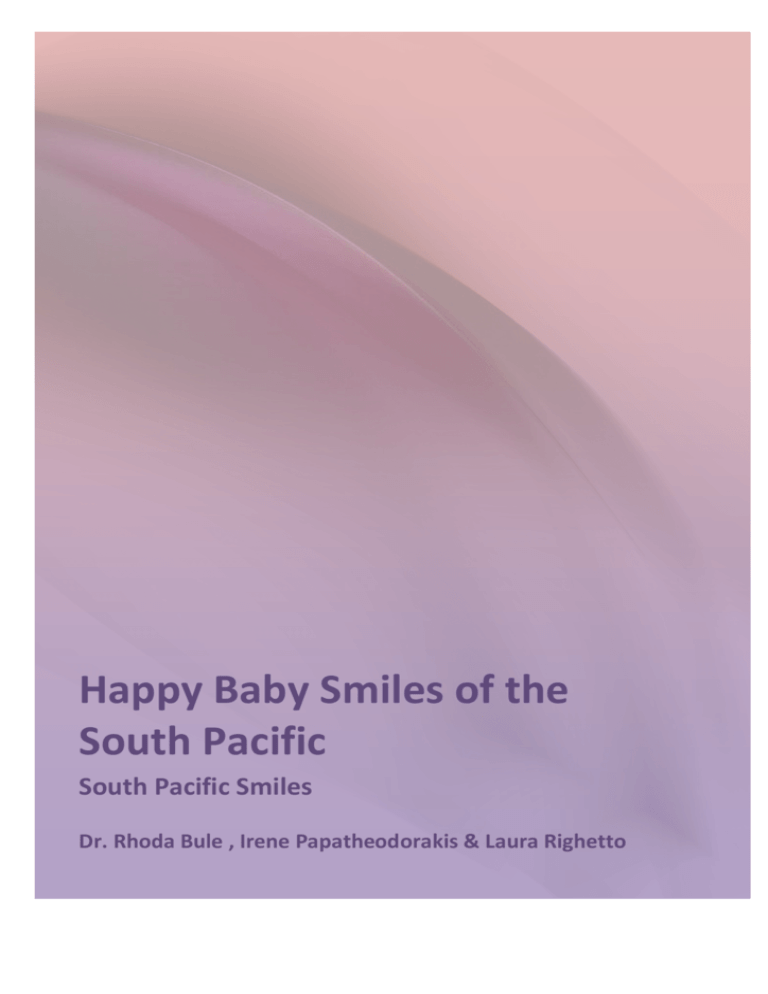
Happy Baby Smiles of the South Pacific South Pacific Smiles Dr. Rhoda Bule , Irene Papatheodorakis & Laura Righetto Project Definition Project Name Happy baby smiles of the South Pacific Project Purpose The purpose of the project is to provide expecting, new, and old mothers with knowledge of dental related issues to empower and allow them to manage and/or prevent dental related issues in the future, not only for their children but for themselves. Common dental issues should be discussed with mothers that arise through pregnancy and infancy, and address any issues or concerns they may have. The project aims to instill effective oral hygiene habits and educate mothers to allow them to make proper oral hygiene and dietary choices, which will hopefully be instilled into their children by having a positive role model exhibiting healthy behaviours. In doing this, both the mother and future generations will be educated about oral hygiene, dental issues and the effect of unhealthy diets, which will be reflected in future evaluations. Ideally this project will have continuing support well into the future to provide mothers and their children with the proper dental related education, and also open up an avenue to communication between oral health professionals and concerned, confused or unaware mothers. Project Justification Early childhood caries (ECC) is a particularly virulent form of dental caries that is characterised by an overwhelming infectious challenge and is associated with the increase of sugars within a diet, lack of fluoride, plaque accumulation and a changing diversity within the oral environment. Eventual destruction of the primary dentition is brought on by sugars, carbohydrates, acids and bacteria known as streptococcus mutans. Thus, ECC has many risk factors, which include biological, behavioural and social determinants. This bacterial disease can be modified by diet and is preventable through toothbrushing, fluoride, and appropriate bottle-feeding practices. In 2007, the World Bank and UNSW HRH Knowledge Hub calculated that there are only 17 dentistry personnel out of a population of 247 262. Although there are 210 village health workers, 263 health management and support workers, 344 professional nurses and 51 midwifes, there is no guidance or oral health promotion provided by these health professionals (Refer to appendix 1). With this, our program aims to promote and improve the oral health of mothers and their newborns through promotion, prevention and early intervention. Oral health promotion is best delivered as soon as possible as very few Ni-Van infants and young children are brought to see a dental professional before the age of five. With that being said, prevention can be accomplished if all workplaces involved with children, regardless of discipline, integrate health promotion, health education and risk reduction into their practice. Another common detrimental effect on the oral mucosa includes dental erosion, where the over consumption of fruit juice and carbonated drinks are given to children. This can eventuate to cause erosion of enamel, leaving it thin and vulnerable to decay. Prevention and management approaches include decreased the intake of acidic beverages, drinking through a straw or using a remineralising agent such as xylitol chewing gum to ultimately treat the underlying dental issue. Early diagnosis and prevention will help to prevent damage to permanent teeth, a issue that needs to be addressed with the mothers (Taji., 2010). Teaching mothers about the risk factors and consequences of ECC, as well as dental erosion is essential. At a young age children begin to mimic their mothers behaviours. Parental knowledge is key to assisting in the prevention of ECC and dental erosion as they can aid in purchasing and cooking the correct foods for their child as well as thorough oral hygiene techniques that they can pass on to their children; as they are the most influential people in a child’s life (Li., & Wang., 2002). Other family members such as grandmothers can also help improve the oral health status of Vanuatu’s most vulnerable population by learning more about incorporating oral health promotion and prevention. Educating mothers on the importance of regular nutritious meals, drinking optimal levels of water and avoiding frequent between-meal snacking is a significant primary prevention approach. IN VANUATU THERE IS NO STATS OR SURVEYS OR FIGURES OF HOW MUCH DENTAL DISEASE THERE IS… NEED TO COLLECT DATA FOR FUTURE GENERATIONS … THE PROJECT HAS THE ABILITY TO BE INTEGREATED INTO A PUBLIC HEALTH SYSTEM THAT IS CURRENTLY NON EXSISTENT. Sponsors Dr Derek Mahony Dr. Veronica Roller Dr. Rhoda Bule South Pacific Smiles Dental Clinic Volunteers Project Stakeholders South Pacific Smiles Dental Clinic Dr. Derek Mahony Dr. Veronica Roller Dr. Rhoda Bule Port Vila Hospital????? Ministry of Health, Vanuatu Shefa Health?? NZ Aid??? AUS Aid??? Project Objectives 1.0 Objectives for mothers 1.1 Provide sufficient information to educate mothers on preventing ECC 1.2 Provide sufficient information to educate mothers on identifying ECC 1.3 Provide sufficient information to educate mothers on the benefits of a healthy diet on the oral cavity 1.4 Provide sufficient information on general oral health changes that need to be made during pregnancy 1.5 Provide sufficient information on the importance of diet, feeding and breastfeeding as well as the implications on the child if bottle feeding is carried out incorrectly 1.6 Provide various alternatives for mothers who have limited knowledge on diet 1.7 Provide mothers with the support they feel is necessary to instill this behaviour change 1.8 Provide mothers with enough confidence to further educate other mothers and additional children 1.9 Post questionnaire to see how much the mothers have learnt and how they value the importance of good oral health and a nutritious diet 1.10 Conduct check ups and intra oral assessments based on risk determined at the initial appointment every 6 or 12months 1.11 Develop an awareness of Oral health messages for mothers 2.0 Objectives for unborn, newborn and children 2.1 Have influential role models that show them the correct way to maintain good oral health 2.2 Conduct check ups and intra oral assessments every 6 months 2.3 Develop an awareness of Oral health messages for children 2.4 Adequate oral health in comparison to children that had mothers who were not previously educated on the effects of poor oral hygiene and an unhealthy diet 3.0 Project Objectives 3.1 Design and create an education resource for mothers who are in need of oral health information 3.1.1 Design and distribute an educational pack with pamphlets to aid the mothers with oral health procedures taught during the “Happy Baby Smiles of the South Pacific” session 3.1.1.1 Appropriate language choice 3.1.1.2 Appropriate image choice 3.2 Raise interest in oral health and general health in both mothers and children caregivers 3.3 Raise awareness of the importance of good oral health and diet 3.4 Raise awareness of the implications of poor oral health and diet 3.5 Raise awareness of the implications of bad habits on the oral cavity, such as thumb sucking, dummy sucking and bottle feeding. 3.6 Strengthen community action through an allied health approach 3.7 Re orient health services where prevention of oral disease is necessary to create a supportive environment for both mothers and caregivers. 3.7.1 Inform and involve the public health care workers of the importance of oral health promotion 3.7.2 Educate the government on the importance of dental personnel 3.7.3 Meeting FDI world recommendations with workforce requirements Project Deliverables Development of project by June 2014 Liaise with Port Vila hospital to confirm project Liaise with Volunteer staff to implement project Delegate specific roles to volunteer staff Design of project definition Program developed and delivered to mothers Develop resources to leave with mothers Develop an oral health program to motivate positive behaviours Develop an oral health program to allow mothers to identify the consequences of a poor diet and poor oral hygiene practices Project analysis and evaluation Modify project in accordance to the results of the analysis and evaluation outcomes Project initially based in Port Vila with the prospect for further extension through out Vanuatu given positive results and success of the program Potential to be incorporated into existing Health Systems given appropriate consultation with other stakeholders such as the government. Project Scope Inclusions Development and implementation of program “Happy Baby Smiles of the South Pacific”. Project evaluation and analysis Hand out resources to mothers and expecting mothers Assembling of report Research the oral health needs of the target group Post project follow up 1 month later Monitor the use of resources and project by future volunteers and South Pacific Smiles staff Exclusions Mothers not expecting children Mothers with children that do not fall within the time bracket Mothers who do not attend the clinic on the specific date chosen to promote oral health Continued monitoring of the program and resources if volunteers and South Pacific Smiles staff do not follow up and continue oral health promotion Project Assumptions Constraints Risks Appendix Appendix 1 Health Professionals per 1000 population, by Provinces in Vanuatu, 2012
